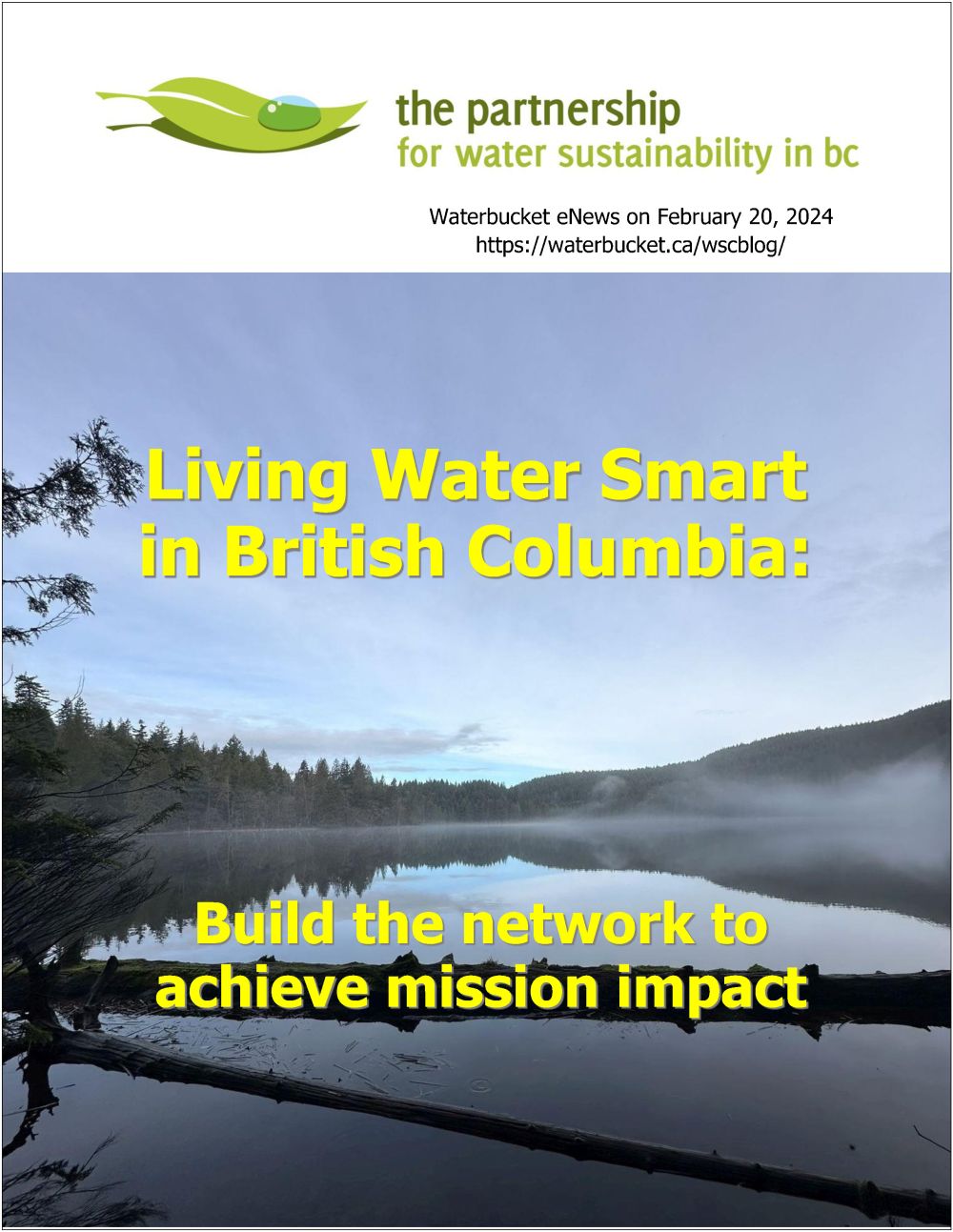GEORGIA BASIN INTER-REGIONAL EDUCATIONAL INITIATIVE: “It is exciting to follow the work of the British Columbia Partnership for Water Sustainability and see how their approach exemplifies network leadership as I have conceptualized it. Their success is so similar to what I have seen in my research,” stated Dr. Jane Wei-Skillern of the University of California at Berkeley
Note to Reader:
Published by the Partnership for Water Sustainability in British Columbia, Waterbucket eNews celebrates the leadership of individuals and organizations who are guided by the Living Water Smart vision. The edition published published on February 20, 2024 featured Dr. Jane Wei-Skillern of the Haas Business School at the University of California Berkley. Her work provides the Partnership for Water Sustainability with a framework for the networked approach to collaboration that explains what we have been doing intuitively for more than two decades in the local government sector.
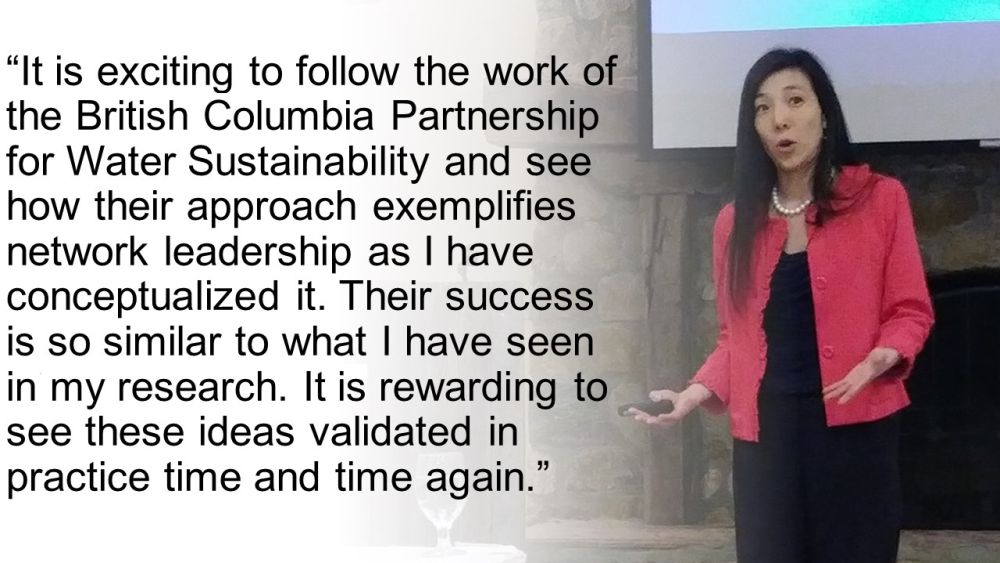
Build the network to achieve mission impact
Dr. Jane Wei-Skillern is co-author of The Networked Nonprofit, groundbreaking research published in 2008. She is a Senior Fellow at the Haas Business School at the University of California Berkeley. This is the #2 ranked business undergraduate program in the USA.
Dr, Jane’s work provides the Partnership for Water Sustainability with a framework that explains what we have been doing intuitively for more than two decades in the local government sector.
“In the early 2000s, when I was on the faculty at the Harvard Business School, I began my research into the concept of a networked approach that is more focused on network-building and trust-based relationships, and less about building an organization to get to your mission impact,” explains Dr. Jane.
Dr. Jane’s four counter-intuitive guiding principles for growing effective networks
“The network emerges around a common goal, rather than a particular program or organizational model. The community mobilizes the resources from throughout the network and does this based on existing relationships in the community.”
Focus on mission before organization. “Effective network leaders build strategies that advance the mission even when it does not result in direct benefits to their organization.”
Build partnerships based on trust, not control. “Leaders depend upon shared values and trust rather than top-down controls and accountability systems.”
Promote others rather than yourself. “Network leaders exhibit a strong norm of humility above all else, sharing credit and foregoing opportunities for individual advancement and institutional growth and brand building.”
Build constellations rather than lone stars. “Leaders who catalyze successful networks acknowledge their weaknesses as readily as their strengths. The goal is to build the larger system that is necessary for delivering on the mission, not to become the market leader.”
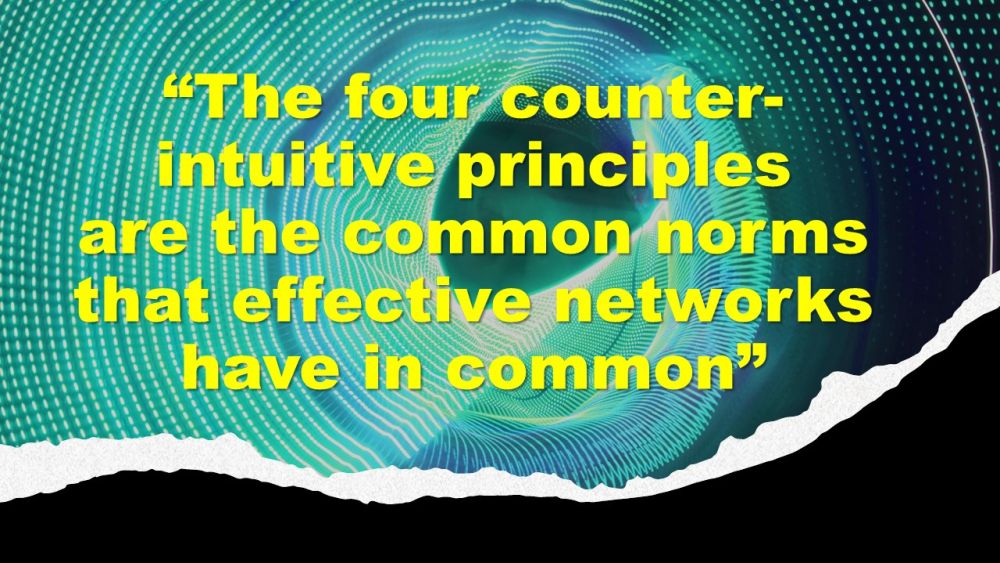
EDITOR’S PERSPECTIVE / CONTEXT FOR BUSY READER
‘The Partnership previously featured Dr. Jane Wei-Skillern in a story published in May 2022, titled Living Water Smart in British Columbia: Four counter-intuitive guiding principles for effective collaboration. She is an ongoing source of inspiration and is a mentor for what we do,” stated Kim Stephens, Waterbucket eNews Editor and Partnership Executive Director.
Instill a culture that supports champions
‘As the hub for the Living Water Smart Network, the Partnership aligns individuals and organizations to deliver results across organizational boundaries…through a model known as collaborative leadership. This modus operandi is unencumbered by the cultural constraints and limitations usually associated with a conventional organization.”
‘The Georgia Basin Inter-Regional Education Initiative, aka “the IREI”, is the mechanism that enables and facilitates inter-regional collaboration in the southwest corner of British Columbia. At the end of the day, the hard work on the ground must be done by our IREI partners.’
“Hence, the Partnership aligns what we do to support their organizational aspirations and objectives. In that way, we can help our partners be successful. But the real key is that their organizations instill a culture that supports champions.’

How to deliver results across boundaries
“Once a network is up and running and proves itself to be effective, it becomes the primary vehicle for change, rather than the individual organizations themselves,” explains Dr. Jane.
“The leaders who work in this way are really competent in what they do. They have great people skills, they are good organizational managers, and they are good at seeing the big picture and identifying where they need to engage others and build the network to solve the problem.”
“I have been studying people who have done this well and gotten great impacts because of it; and documented the patterns and themes from their work. So, it is no surprise that other people who are working in this way are succeeding.”
“Virtually all people working in this way did not learn it from me, but rather came to this approach intuitively. The Partnership for Water Sustainability has been getting positive results working in this way long before its leaders came across my research.”
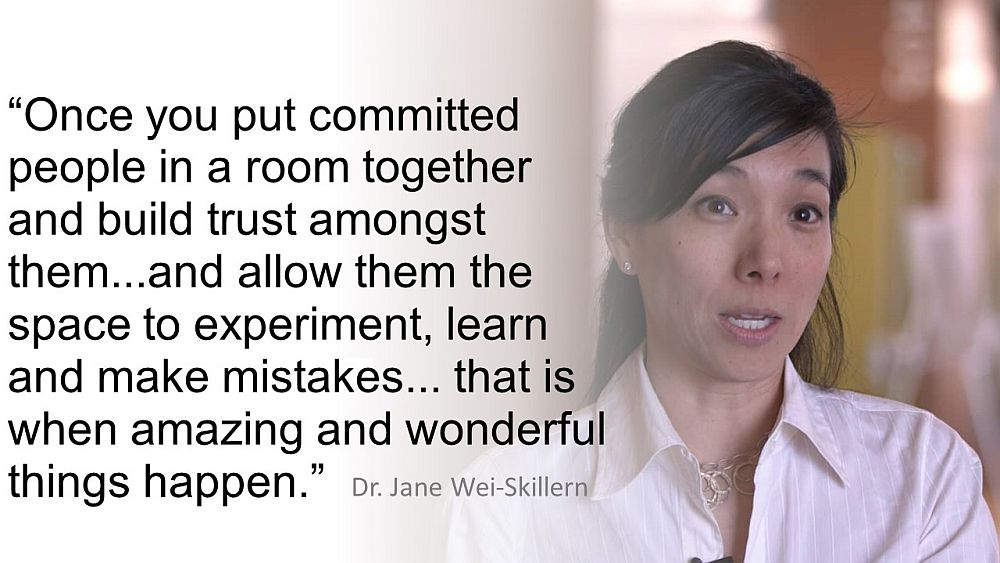
STORY BEHIND THE STORY: Build the network to achieve mission impact – extracts from a conversation with Dr. Jane Wei-Skillern
“Rather than continue to teach MBA students, my focus is now on the speaking and practitioner side of the work,” says Dr. Jane. “That is where I really feel the demand is…and the opportunity for impact….because the people doing the work NOW can take the ideas and run with them immediately.”
“Often, my research resonates most with practitioners who are struggling and have enough experience to know they do not have all the answers. They also have a degree of humility because of experience and perhaps failure. That is what makes them able to take these ideas and move forward more readily. My goal has always been to have the most impact with my time.”
“I so often say this work and this way of leading through collaboration is very intuitive. It is not rocket science. You do not need a PhD to learn or understand this. It is in our midst all the time in different communities. In virtually every community, there are people working and leading in this way.”
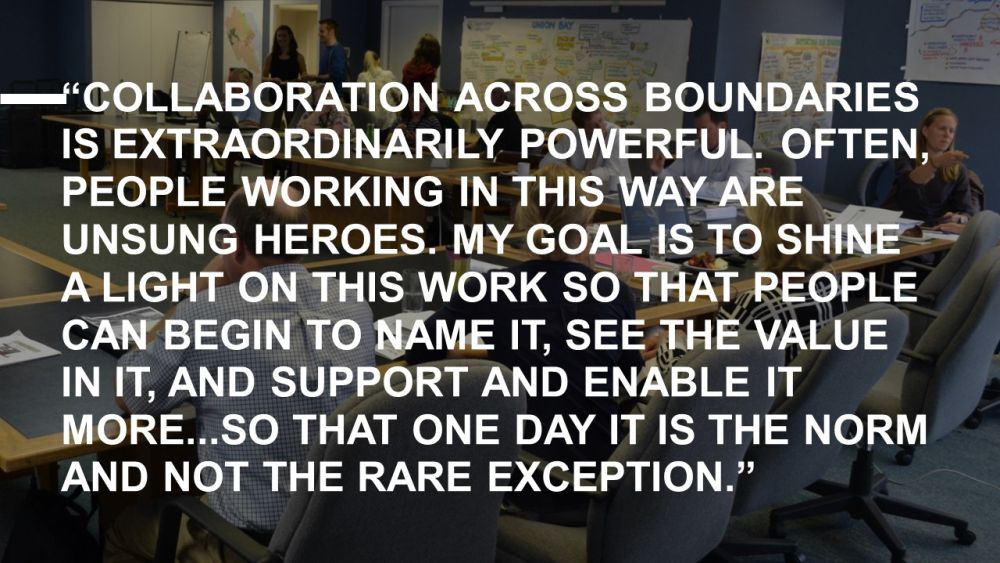
Open the flood gates and let this way of engaging and energizing grow and thrive
“Coming out of the pandemic, there is a greater openness to new ways of working. In-person gatherings are also very conducive to this way of leading because it is all about investing in relationships, building trust, and fostering community. It has been very exciting and the most rewarding work that I have ever done.”
“I have been working across all different fields, from environmental education for youth to senior services because I am not a context expert in any particular issue area, but rather knowledgeable about this way of leading.”
“It is fun to share the wisdom that I have gained from studying people who have done the work in this way for a very long time. While I believe we are turning the corner, I do wish that everyone had been working in this way YESTERDAY. We would likely be a lot better off and actually be ahead of the game on so many social and environmental issues.”
“We all know that humanity is facing unprecedented, complex challenges that cannot be overcome by individual institutions, or even sectors. The change cannot come soon enough because this is so needed. But it is still relatively rare that entire organizations or systems within particular fields are working in this way.”

Shine the light on the positive and align efforts to make communities better places
“It is about giving the younger generation of leaders that hope that there is a path forward. Put your own ego and self-interest behind the shared goals. Build and engage a broad community to do contribute to become part of the solution. We need more of that. On a lot of problems, it is win/win if we work in this way. There is no downside to finding a common path to travel.”
“There is so much opportunity and potential out there that is very actionable. That is where I choose to focus. There is a lot of benefit in working with others as a trusted partner and being trustworthy yourself. Find trusted partners who have integrity and values that align with your own and move forward together.”
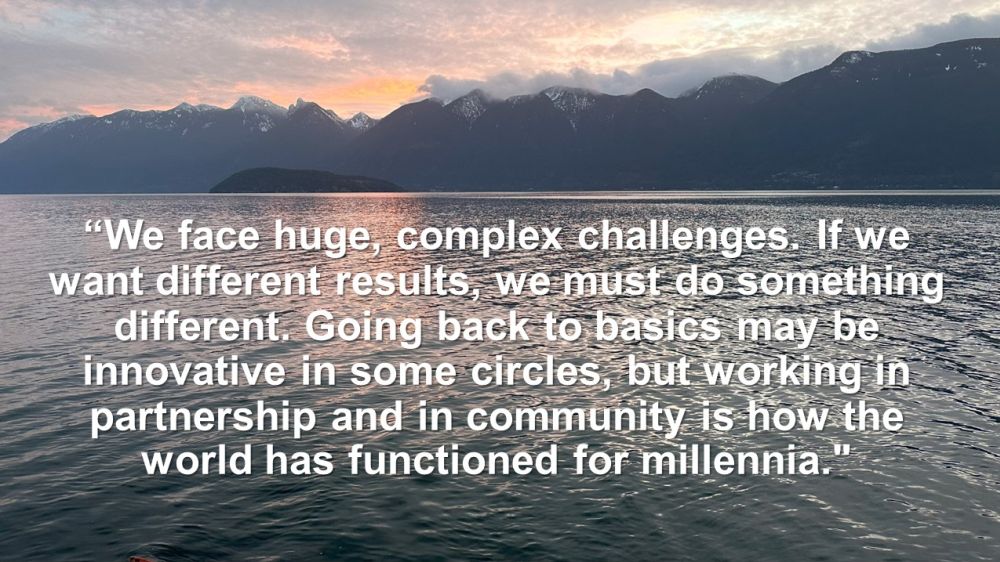
Inter-personal connections and learning from each other leads to better outcomes
“Seeing people connected to their phones and devices is a worrisome trend. Get off your devices. Interact with others as fellow human beings to build those connections, build trust, build relationships. Because that creates an openness to being vulnerable and to listening and learning from each other.”
“Across any group, more than likely our peers will have something valuable to add. Deep trusted connections with your fellow humans is far more meaningful and rewarding than a ‘connection’ with some YouTube influencer.”
“Those inter-personal connections start to build and grow so that you can be potential allies and partners in solving the very real challenges that people are facing in their work. But we rarely take the time to do that.”
“So often, when we gather for meetings, we immediately focus on what needs to be done. We rarely take the time to connect on a personal level and learn about our potential collaborators and their backgrounds and interests.”
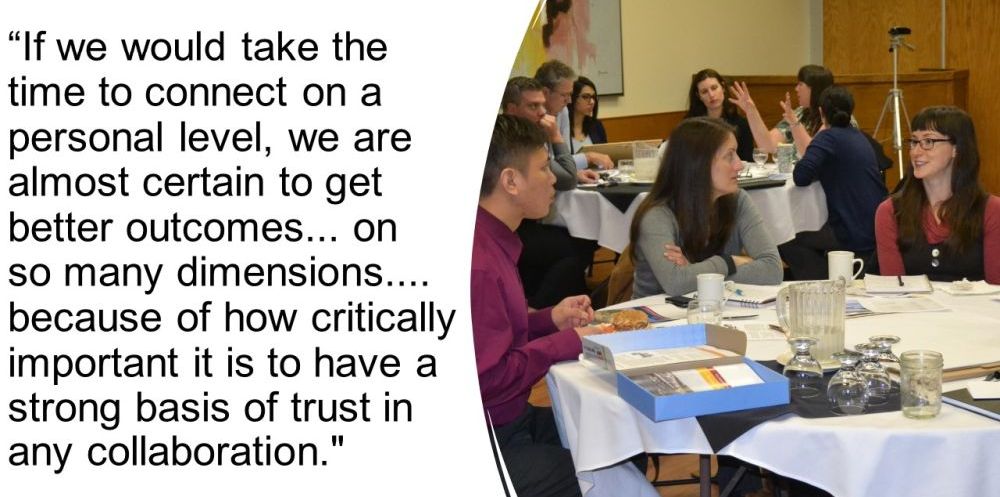
Openness to networks should help pass the inter-generational baton
“If we are successful in changing the system to one where decision makers are leading through a networked approach, that would surely enable the younger generation who already think in terms of networks. Keep in mind, however, that their networks are still used for more selfish purposes.”
“But if we could marry the younger generation’s openness to networks to networks for achieving the common good, therein lies the opportunity. And that is where there needs to be more growth, and more education or engagement on how that can be used.”
“When we say, let’s get to know each other so that we understand where each of us is coming from, and explore how can I help you with your challenges and vice versa….that changes the whole tenor of the relationship. We can be partners and support each other. We come out stronger if we do that,” concludes Dr. Jane Wei-Skillern.

Living Water Smart in British Columbia Series
To download a copy of the foregoing resource as a PDF document for your records and/or sharing, click on Living Water Smart in British Columbia: Build the network to achieve mission impact.


